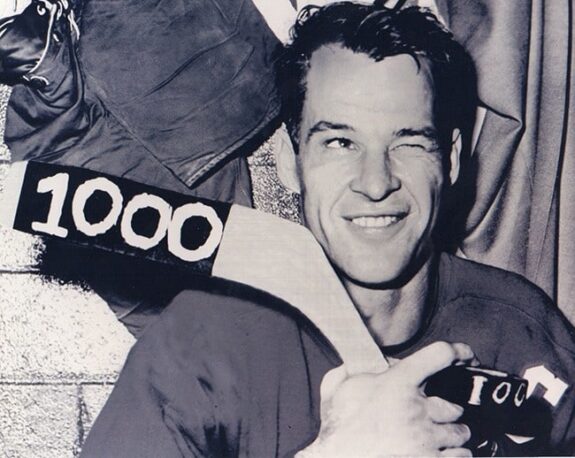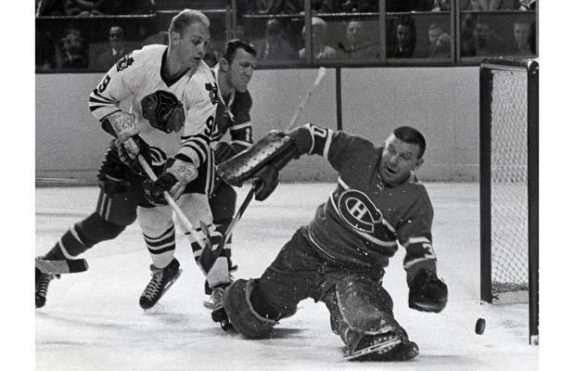One of the legends of the NHL announced his retirement on this date, but he wasn’t able to stay off the ice very long. This date also saw two Hockey Hall of Fame induction ceremonies and a memorable postgame speech after a tough international loss. It’s time for our daily journey through the decades to revisit all the best moments Sept. 8 has given us.
Mr. Hockey Retires….For the First Time
Gordie Howe announced his retirement on Sept. 8, 1971, after 25 seasons with the Detroit Red Wings. At the time, he was the NHL’s all-time leader, with 1,687 games played, 786 goals, 1,023 assists, and 1,809 points. He helped lead the Red Wings to four Stanley Cups while winning the Hart (league MVP) and Art Ross Trophies (leading scorer) six times each. The Hockey Hall of Fame waived its mandatory three-year waiting period and inducted Howe in 1972.

Howe’s retirement was not permanent as he joined his sons, Mark and Marty, on the Houston Aeros of the World Hockey Association (WHA) in 1973. He played in all six seasons of the WHA’s brief history and scored 174 goals and 508 points in 419 games.
When the WHA merged with the NHL before the 1979-80 season, Howe was back in the league where he became a legend of the sport. He played in 80 games for the Hartford Whalers that season, at the age of 51, scoring 15 goals and 41 points. He retired for good following the Whalers’ first-round exit from the Stanley Cup playoffs.
Soviets Take Last Game in Canada
The fourth game of the Summit Series was played on Sept. 8, 1972, in Vancouver, BC, and it was the final contest held in Canada. After each team earned a win and tie over the first three games, the Soviet Union won Game 4, 5-3, at the Pacific Coliseum.
Team Canada, missing two of their top defensemen in Guy Lapointe and Serge Savard, got into early penalty trouble. Boris Mikhailov scored a pair of power-play goals to give the USSR a 2-0 lead before the game was even eight minutes old. Bill Goldsworthy, who was put into the lineup for his energy, was in the penalty box for both goals against.
Gilbert Perreault got Canada on the board early in the second period, but Yuri Blinov scored on a 2-on-1 rush less than a minute later to restore the Soviet Union’s two-goal advantage. Vladimir Vikulov added another goal to take a 4-1 lead into the second intermission.
Goldsworthy redeemed himself with an early third-period goal, but the Soviets had another answer, this time, it was Vladimir Shadrin who scored. In the final minute of play, Dennis Hull added a third Canadian goal, but it was too little too late. Goaltender Vladislav Tretiak made 38 saves in the win, including 19 in the third period.
As the team was skating off the ice, many of the nearly 16,000 in attendance showed their displeasure by booing them. This caused Boston Bruins star, Phil Esposito, to make an impassioned postgame speech. The series took a two-week break before it picked up again with four games in Moscow, Russia.
Two Hall of Fame Classes Inducted
The Hockey Hall of Fame held two induction ceremonies on this date, two years apart, where they enshrined a total of six players and two builders.
On Sept. 8, 1980, a pair of goaltenders, Harry Lumley and Gump Worsley headlined the Hall of Fame class. Lumley, a two-time All-Star who played in 803 games, over 16 NHL seasons, for the Red Wings, New York Rangers, Chicago Blackhawks, Toronto Maple Leafs, and Bruins. He went 330-329-142 with a 2.74 goals-against average (GAA) and 71 shutouts. He won the Stanley Cup with the Red Wings in 1950.
Worsley’s career spanned 21 seasons with 860 games played for the Rangers, Montreal Canadiens, and Minnesota North Stars. He posted a record of 333-348-149 with 2.87 GAA and 43 shutouts. He won the Calder Trophy for being voted as the best rookie of the 1952-53 season. He was a member of four Stanley Cup championship-winning teams in five seasons with the Canadiens.

Forward Lynn Patrick was the third player inducted in 1980. He scored 135 goals and 336 points in 455 games for the Rangers, where he won a Stanley Cup in 1940. Jack Butterfield, the longtime president of the American Hockey League (AHL), was the lone builder of the class.
Two years later, on Sept. 8, 1982, Yvan Cournoyer, Rod Gilbert, Norm Ullman, and Emile Francis were inducted into the Hall of Fame. Cournoyer scored 428 goals and 863 points in 968 games and won eight Stanley Cups with the Canadiens. Gilbert spent his entire 18-season career with the Rangers and is still the franchise’s all-time leader with 406 goals and third in games played with 1,065; behind only Brian Leetch (1,119) and Harry Howell (1,160). Ullman scored 490 goals and 1,229 points in 1,410 games with the Red Wings and Maple Leafs. Francis was put in as a builder for his work as head coach and general manager of the Rangers.
Odds & Ends
The Rangers signed Finnish hockey champion Mikko Leinonen on Sept. 8, 1981. He played 162 NHL games over three seasons in New York and one with the Washington Capitals. He scored a total of 31 goals and 109 points. The highlight of his career came on April 4, 1982, when he picked up a record six assists in a 7-3 playoff victory over the Philadelphia Flyers. Wayne Gretzky tied his record in 1987.
On this same day, the Rangers sent goaltender Doug Soetaert to the Winnipeg Jets for a third-round pick in the 1983 NHL Entry Draft. Soetaert played in 130 games for the Jets over the next three seasons. He went 50-48-21 with a .869 save percentage (SV%) and 4.24 GAA to go along with a pair of shutouts. The Rangers eventually drafted defenseman Vesa Salo, who never played in the NHL.
The St. Louis Blues announced that Roger Neilson had been added as an assistant coach on Sept. 9, 1995. This move came a couple of months after Neilson was fired by the Florida Panthers. He remained with the Blues for two seasons before being hired as the head coach of the Flyers in 1997.
On Sept. 8, 2003, the Mighty Ducks of Anaheim named Steve Rucchin as their team captain, who had been with the franchise since their first season. He was the fifth captain in franchise history after Troy Loney, Randy Ladouceur, Paul Kariya, and Teemu Selanne.
Cory Stillman announced his retirement on Sept. 8, 2011. The left winger was originally drafted by the Calgary Flames with the sixth overall pick of the 1992 NHL Entry Draft. He played in 1,025 games, over 16 seasons, with the Flames, Blues, Tampa Bay Lightning, Carolina Hurricanes, Ottawa Senators, and Panthers. He scored 278 goals and 727 points. Stillman won two Stanley Cups during his career; in 2004 with the Lightning and 2006 with the Hurricanes.
Happy Birthday to You
Sept. 8 has been the birth date of 17 current and former NHL players over the years. The first to play in the league was Bud Maracle, who was born on Sept. 8, 1904. He played in 11 games for the Rangers in 1931, scoring one goal and four points.
Goaltender Rogie Vachon is the lone Hockey Hall of Famer of this lot. Born on Sept. 8, 1945, Vachon won 353 over 16 seasons with the Canadiens, Los Angeles Kings, Red Wings, and Bruins. He won back-to-back Stanley Cups with Montreal in 1968 and 1969.
Marco Sturm, born on this date in 1978, had the most successful career among the skaters. He played 938 games for six different teams, scoring 242 goals and 487 points.
Other notable players born on this date include Jay McKee (46), Teddy Purcell (38), Michal Kempny (33), Nino Niederreiter (31), and the late Jack McIntyre.
*Originally constructed by Greg Boysen
Sign up for our NHL History Substack newsletter
